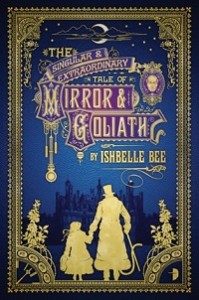 “1888. A little girl called Mirror and her shape-shifting guardian Goliath Honeyflower are washed up on the shores of Victorian England. Something has been wrong with Mirror since the day her grandfather locked her inside a mysterious clock that was painted all over with ladybirds. Mirror does not know what she is, but she knows she is no longer human.
“1888. A little girl called Mirror and her shape-shifting guardian Goliath Honeyflower are washed up on the shores of Victorian England. Something has been wrong with Mirror since the day her grandfather locked her inside a mysterious clock that was painted all over with ladybirds. Mirror does not know what she is, but she knows she is no longer human.
John Loveheart, meanwhile, was not born wicked. But after the sinister death of his parents, he was taken by Mr. Fingers, the demon lord of the underworld. Some say he is mad. John would be inclined to agree.
Now Mr Fingers is determined to find the little girl called Mirror, whose flesh he intends to eat, and whose soul is the key to his eternal reign. And John Loveheart has been called by his otherworldly father to help him track Mirror down…”
This is a hard book to know how to review. And it’s hard to explain why without quoting so extensively from the book that this page would be a wall of text. I think what it boils down to is that the novel is interesting, but it suffers for the author over-emphasizing style over substance.
The linguistic trick that is thickest on the ground is the use of similes and metaphors. This is especially true of the chapters narrated by Mirror. I wonder if the author wanted to invoke a sense of childlike wonder with Mirror’s observations, but if so, it wasn’t done well. On the other hand, there’s some really beautiful use of language in these sections, so I really wish it had fit in more smoothly with the rest of the book.
One thing I had trouble with was the constant jumping to different characters’ points of view. Sometimes the POV would change with every chapter, but sometimes a character would have the reins for two or three chapters. And it wasn’t always clear at the start of a chapter who was speaking. The ones I liked the most where the two police officers, and I think that was because those sections were the easiest to clue into and follow as they went along.
I think that the frequent POV jumps contribute to the other thing I noticed–the plot didn’t have a lot of forward momentum. It’s hard for a story to progress when you’re constantly giving perspectives on every possible aspect of the situation. Also, about half the novel seemed to be composed of flashbacks, which do give depth to the scenario, but also halt the story’s movement in the “now”.
Even with all of this, there is something in this book that makes you want to keep reading. The language is lovely, the characters are memorable, and there are some cool ideas that Bee wove into the story that tie in with this time period’s history. I have to wonder if this particular style of writing just isn’t for me, but I do think that the novel could have been improved on.
Yes, I had a few things to complain about with regards to this book, but I ended up being intrigued by what Bee is trying to do, and I’ll probably go on with the next book to see how things continue to play out.

This book was provided by the publisher in exchange for an honest review.
(Description nicked from B&N.com.)